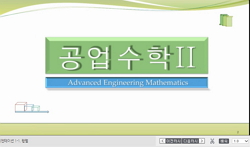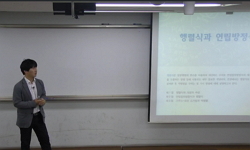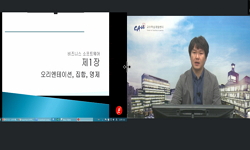The vibrant demand for academic excellence in the twenty-first century has brought diverse determinants of students’ outcome into play. However, few studies have validated the instruments and examined the mediating effect between exogenous and endog...
http://chineseinput.net/에서 pinyin(병음)방식으로 중국어를 변환할 수 있습니다.
변환된 중국어를 복사하여 사용하시면 됩니다.
- 中文 을 입력하시려면 zhongwen을 입력하시고 space를누르시면됩니다.
- 北京 을 입력하시려면 beijing을 입력하시고 space를 누르시면 됩니다.
https://www.riss.kr/link?id=A104855568
-
저자
Mohammed Borhandden Musah (Universiti Teknologi Malaysia) ; Hairuddin Bin Mohd Ali (International Islamic University Malaysi) ; Shafeeq Hussain Vazhathodi Al-Hudawi (Universiti Teknologi Malaysia) ; Lokman Mohd Tahir (Universiti Teknologi Malaysia) ; Khadijah Binti Daud (Universiti Teknologi Malaysia) ; Abdul Rahim Hamdan (Universiti Teknologi Malaysia)
- 발행기관
- 학술지명
- 권호사항
-
발행연도
2015
-
작성언어
English
- 주제어
-
등재정보
KCI등재,SCOPUS,SSCI
-
자료형태
학술저널
-
수록면
579-589(11쪽)
-
KCI 피인용횟수
1
- 제공처
-
0
상세조회 -
0
다운로드
부가정보
다국어 초록 (Multilingual Abstract)
The vibrant demand for academic excellence in the twenty-first century has brought diverse determinants of students’ outcome into play. However, few studies have validated the instruments and examined the mediating effect between exogenous and endogenous variables of the student outcome model. This study, therefore, investigates the psychometric properties of four scales: two modified subscales of SERVQUAL: quality of teaching and learning and quality of classroom, qualified instructional leader and student outcome. It also investigates student outcome determinants and the role of teaching and learning and classroom quality in mediating the relationship between qualified instructional leaders and student outcomes. The study adopts a full-fledged structural equation modelling approach and analyses data collected through a total of 450 questionnaires distributed among undergraduates of a public university in Malaysia. The findings demonstrate that student outcomes and qualified instructional leader instruments comprise three dimensions, whereas teaching and learning and classroom quality instruments comprise a single dimension each and support the composite reliability, convergence and discriminant validity of the scales. The results indicate that determinants of student outcome predict learning student outcomes. The results also demonstrate that teaching and learning quality strongly and positively mediates the relationship between qualified instructional leaders and student outcomes, whereas classroom quality positively but weakly mediates the relationship. The theoretical and practical implications of the study were also addressed.
참고문헌 (Reference)
1 Simon Marginson, "University mission and identity for a post post‐public era" Informa UK Limited 26 (26): 117-131, 2007
2 Lin, R., "The relationship between teacher quality and teaching effectiveness perceived by students from industrial vocational high schools" 1 (1): 167-187, 2010
3 Levine, T. R., "The desirability of using confirmatory factor analysis on established scales" 23 (23): 309-314, 2006
4 Oliver, R. M., "Teacher classroom management practices: Effects on disruptive or aggressive student behaviour" 2011 : 4-, 2011
5 Mulford, B., "Revised models and conceptualisation of successful school principalship for improved student outcomes" 25 (25): 61-82, 2011
6 Mashburn, A. J., "Measures of classroom quality in prekindergarten and children’s development of academic, language, and social skills" 79 : 732-749, 2008
7 Mulford, B., "International Encyclopedia of Education" Elsevier 143-150, 2010
8 Litwin, M. S., "How to measure survey reliability and validity" Sage Publications Inc 1995
9 Messick, S., "Educational measurement" American Council on Education 13-100, 1989
10 Levine, T. R., "Confirmatory factor analysis and scale validation in communication research" 2 (2): 331-338, 2005
1 Simon Marginson, "University mission and identity for a post post‐public era" Informa UK Limited 26 (26): 117-131, 2007
2 Lin, R., "The relationship between teacher quality and teaching effectiveness perceived by students from industrial vocational high schools" 1 (1): 167-187, 2010
3 Levine, T. R., "The desirability of using confirmatory factor analysis on established scales" 23 (23): 309-314, 2006
4 Oliver, R. M., "Teacher classroom management practices: Effects on disruptive or aggressive student behaviour" 2011 : 4-, 2011
5 Mulford, B., "Revised models and conceptualisation of successful school principalship for improved student outcomes" 25 (25): 61-82, 2011
6 Mashburn, A. J., "Measures of classroom quality in prekindergarten and children’s development of academic, language, and social skills" 79 : 732-749, 2008
7 Mulford, B., "International Encyclopedia of Education" Elsevier 143-150, 2010
8 Litwin, M. S., "How to measure survey reliability and validity" Sage Publications Inc 1995
9 Messick, S., "Educational measurement" American Council on Education 13-100, 1989
10 Levine, T. R., "Confirmatory factor analysis and scale validation in communication research" 2 (2): 331-338, 2005
11 Meyers, L. S., "Applied multivariate research : Design and interpretation" SAGE Publications Inc 2006
동일학술지(권/호) 다른 논문
-
Educational choice and marketization in Hong Kong: the case of direct subsidy scheme schools
- 서울대학교 교육연구소
- Yisu Zhou
- 2015
- KCI등재,SCOPUS,SSCI
-
- 서울대학교 교육연구소
- Yujeong Park
- 2015
- KCI등재,SCOPUS,SSCI
-
How to improve academic optimism? An inquiry from the perspective of school resource and investment
- 서울대학교 교육연구소
- Jason Hsinchieh Wu
- 2015
- KCI등재,SCOPUS,SSCI
-
- 서울대학교 교육연구소
- Ali Yildirim
- 2015
- KCI등재,SCOPUS,SSCI
분석정보
인용정보 인용지수 설명보기
학술지 이력
| 연월일 | 이력구분 | 이력상세 | 등재구분 |
|---|---|---|---|
| 2023 | 평가예정 | 해외DB학술지평가 신청대상 (해외등재 학술지 평가) | |
| 2020-01-01 | 평가 | 등재학술지 유지 (해외등재 학술지 평가) |  |
| 2005-01-01 | 평가 | SSCI 등재 (등재후보1차) |  |
| 2003-01-01 | 평가 | 등재후보학술지 선정 (신규평가) |  |
학술지 인용정보
| 기준연도 | WOS-KCI 통합IF(2년) | KCIF(2년) | KCIF(3년) |
|---|---|---|---|
| 2016 | 0.38 | 0.18 | 0.33 |
| KCIF(4년) | KCIF(5년) | 중심성지수(3년) | 즉시성지수 |
| 0.28 | 0.27 | 0.292 | 0.09 |






 KCI
KCI




